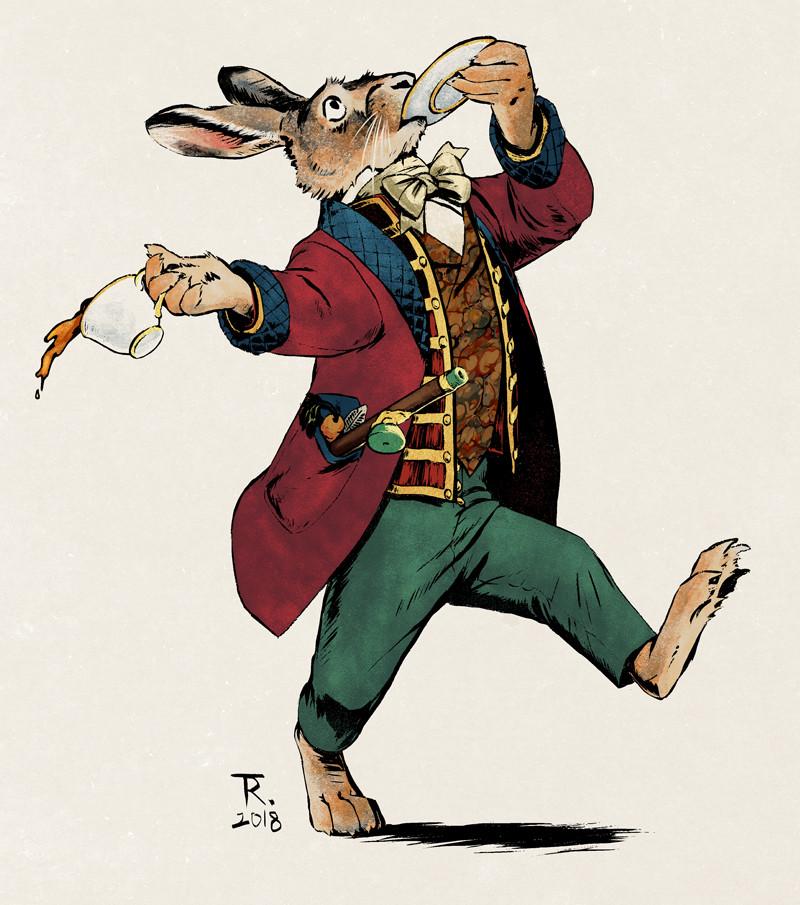WO KE DownTheRabbitHole
AnOdysseinSocialCritiqueandCorruption


NOVAEMBER

DOWN THE RABBIT HOLE
Remember, remember The fifth of November The Gunpowder treason and plot; Iknowofnoreason Why the Gunpowder treason Shouldever be forgot!!!
Guy Fawkes Night Poem
Automated techniques used to analyse text and data in digital form for the purpose of generating information, under Sections 15a, 15b and 15c of the Copyright Act (text and data mining), are prohibited.
©2024 Nova Ember
Illustration: Nova Ember
Publisher: BoD ∙ Books on Demand, Östermalmstorg 1, 114 42 Stockholm, bod@bod.se
Printing: Libri PlureosGmbH, Friedensallee 273, 22763 Hamburg, Germany
ISBN:978-91-8080-140-9
On acold, rainy November night, asoldier called Guy Fawkes finds himself in abig old cellar in central London. The year is 1605. There, at the Palace of Westminster, he is posted to guard several barrels of dynamite. What Fawkes andno-one else in the old parliament building is aware of is that soon several kilos of explosives would detonate, sweeping away years of political oppression.1 His patient waiting is the result of thesecret meeting held about ayear earlier. The opening words of the meeting are: "Shall we always, gentlemen, talk and never do anything?" and are spoken by one of thethirteen resistance fighters who, because of this meeting, would go down in history. They initially agree to dig atunnel under the streets of London all theway to the Houses of Parliament, but by ahappy coincidence, and against all odds, they manage to rent aroom in the basement vault, directly under Parliament. 36 barrels of gunpowder are transported over the next few months into the basement, afew at a time and in various ingenious ways. The thirteen people involved manage to do it so unnoticed, that their crusade against the British government seems to be backed by ahigher power.
Later, afterthe coup is uncovered, the British government, fearing rebellion, fabricates its ownversion of events. This was not the last time that government and those in power would revise the public's understanding of events, which will be carried throughout this book, like along red thread.2
1Oxford dictionary, https://www.oxforddnb.com/display/10.1093/ref:odnb/9780198614128.001.0001/ odnb-9780198614128-e-92749
2James Sharpe, Remember Remember,Acultural history of Guy Fawkes, Harvard University Press, Massachusetts,2005
Preface
No-one is more hopelessly enslaved than those who falsely believe they are free3
Johann Wolfgang Goethe
The common man of the 21st century, lives in the belief that everything that happened in history is available for publicknowledge. This political Odyssey is written to dispel this delusion and open up awider perspective, as the book's author goes back to the very origins of where it began.
The aim is not only to question and criticise prevailing political layers. For along time, people in the West have been shaped by ahidden political agenda, the structures of which need to be publicised, analyzed and broughttothe surface. Totalitarianism is usually attributed to the Soviet regime, China or North Korea. This book will reveal how such totalitarianism is also widespread in the West; not an open totalitarianism, ruling through dictatorships, but acovert one. This is why this bookmust confront the Marxist/socialist ideology that has ruled West andother parts of the world for over ahundred years, as well as the new WOKE generation coloured by Marxism. This raises important questions about gender dysphoria and sex operations on young people, Marxist feminism, anti-racism and identity politics.Atthe same time, the aim is to question the reputation of right-wing politics and to cleanse conservative politics of its involuntary association with Nazism, racism and fascism.
Among other things, the reader will learn how over-
3Die Wahlverwandtschaften -Hamburger Ausgabe,Volume 6, dtv, Munich 1982, p. 397 (II,5)
consumption and bigbusiness corporations, through socialist policies andspecialised public relations techniques, have been holding aspell on humanity for over acentury. The book aims to enable the reader to simply wash the image of society and history as it has been taught through the educational system, and the authors want the new conclusions drawn to be closer to the authentic truth.
Authors and other individuals have indeed touched on these pieces in the past; in this book we try to make asummarising overview, anarrative anthology, a kind of ABC-book for all those who fight for truth and freedom -old and new -and reveal cognitive illusions and patterns behind corrupt political systems. The book concludes with proposals for reforming outdated political structures, enabling anew people-friendly development. Thebook endeavours to reveal how political power games have limited human development, but does not outline all the options that can replace the old, outdated, corrupt political system, and leaves it partially open,with the hope that through human potential, new political paths can be found.
What are the state of things -really?
In the middle of the journey of our life Icame to myself within adark wood where the straightway was lost4
Dante Alighieri
Let's imagine in athought experiment that all government officials and politicians are trustworthy and do their work honestly, honestly and openly. No agenda is kept secret from the people –ever; all political decisions arecompletely transparent, even in war and militaryoperations. The western world is aperfect democracy where people have asay in shaping societyat every stage. People can affect political decisions through democratic referendums and be involved in making new decisions through democratic votes. All big businesses andlarge corporations have honest intentions, and only want the best for people thus offering products that consumers themselves want to buy. Newspapers, media andjournalists clearly report all world events in aneutral, factual and unbiased waythey never -ever -hide the truth.
Throughout allthe centuries of human history, there have been rulers -the priesthood or pope, agovernment or aparliament, aking or emperor; also associated officials who exercised power on behalf of others. One can say that thepower has been held by the elite, whose shape and name has varied from century to century. But onething that has remained constant is the unequal relationship between the power apparatus and the rest of the population. If you think that this inequality has diminished with the passage of history,
4Dante Alighieri, Inferno Canto I:1-60 The Dark Wood and the Hill
and thatkings were only cruel and domineering in the past, you are mistaken.
However, throughout thethousands of years that power has been in the hands of the elite, there have also been different types of resistance movements. One of the very first protest movements was the 'Protestants', who gave Protestantism its name. Another movement was the Peasants' Revolt, which gave rise to the right to votefor an entire peasant class. Or the Chartism movement in England in 1838-1848, whose sufferings led to the concept of 'suffrage'. These protest or resistance movements have declined significantly in the 21st century.
If you look at how democracy in theWest has been conducted in recent years, you can ask the questionwhat decisions have I, personally, as an individual made, when it comes to my surroundings, the large society, or "my" small neighbourhood? How does the democratic society we live in function, where "everyone" should be able to be asked about the governance of society and vote? And how powerful are politicians really? This book will try to answer these important questions.
All decision-making processes pushed through by those in power are based on the premise that the decisions are "necessary" or that they must be taken"progress cannot be stopped". Perhaps an expert or consultant is hired to confirm aproposal. It may be that politicians encounter protests where people oppose this proposal -usually the protest is left unanswered and thus does not influence decision-making. Then, of course, there are people who are notsointerested in what politicians do -aslong as "everythingworks".
What positionofpower does this put the 'ordinary' citizen in? Do they even have time to reflect on their position in society, time to “opt out” of the consumer
society, or do they have to work several days aweek, several hours aday, only to be swamped by gadgets, technology and clothes, with their attention always diverted elsewhere? We have this idea, especially in the West, thatwelive in ademocracy. And we have an idea that we as individuals can choose how power is exercised. So we are notparticularly worried. Instead, we can spendthe time that is left, on entertainment, sport and consumption.
And how much power does the consumer society really have over us? To answer the question, you only need to observe yourfellow human beingsfor ashort while, perhaps on the subway or in the street, and if you try to estimate the price tag for all the clothes each person is wearing, youcan easily reach several hundred dollars.
Furthermore, imagine that the same person has several sets of similar clothes at home and awardrobe worth 3to5 thousand dollars. If you look out into the crowd and add up these figures, you start to get a staggering idea of the massive amounts of money flowing from consumers into the bigcorporations, and it doesn't stopwith clothes. There is ahuge stream of consumption going on daily, that most people are not aware of. Clothes have to be replaced afew of times a year, and the same goes forhousehold goods, phones, technology, appliances, furniture. Has it always been like this? Mobile phones lasted for decades in the early 1990s,without breaking. The same durability was found in the hi-fi gadgets of the 1980s. When Apple produced an iPhone that broke down after afew years, became "outdated" and needed to be "updated", the hightech company created anew trend. Suddenly, people needed to replace their mobile phones after just afew years. This pattern grew strong, so strong that no one would question it anymore.
Has mankind always been so dependent on gadgets and
stuff, one might ask? And were gadgets and clothes made in the past, in the same way as they are now -clothes that only lasta year, gadgets that break -for the benefit of bigbusiness andjust in time for the next trend? Thesame 'throwaway culture' has also moved into politics: progressivism is partly based on politicians pushing through an idea that changes as soon as the next idea comes along. The sustainable thinking that is so much talked about is missing here as well.
The Father of PR-relations
Thou speak'st like him's untutor'd to repeat: Who makes the fairest show means most deceit. But bring they what they will and what they can, What need we fear?5
William
Shakespeare –Merchant of Venice
It all started at thebeginning of the last centurywith aman called Edward Bernays who, despite the enormous impact he left on the world, is relatively unknown. Linking people's subconscious desires to products they don't need, Bernays simultaniously created an entirely new revolutionary political method -by satisfying people's inner selves with products and consumption, you make them more compliant.These theories were conceived acentury ago and are still alive in society today.
At the beginning of the 20th century, Sigmund Freud discovered that people's emotions are located in the unconscious andhis ideas were epoch-making. Examining the humanpsyche and civilisationfrom apsychological perspective had previously been unthinkable. Freud linked emotions such as aggression and sexuality to external behaviour and gave rise to other major groundbreaking theories. Hisnephew Edward Bernays, an educated journalist, works as amarketing consultant for successful entertainers in Viennabut the First World War forces himtomove to America. During the war, all major political powers use war propaganda to influence the population and the US government hires Bernays as a propaganda consultant. Because of his dedication, he is quickly recognised as aforce to count on.
At the end of the war, he is invited to the Paris
5William Shakespeare Merchant of Venice Pericles, Act I, Scene 4
Conference, aged just 26. He is stunned by the hero's welcome given to President Woodrow Wilson and the way people worshiped him. An idea is born -isitpossible to create similar 'mass persuasion' in times of peace? After the war, Bernays finds the word 'propaganda' too cumbersome and changes the name to 'Public Relations'. Unbeknownst to him, he invents theterm that will be used for an entire eratocome. His theory is that if you can use propaganda in war -you can use it in peace. Back home, he finds apeacetime America and wants to understand how the masses think. He contacts his uncle, Sigmund Freud, and receives acopy of 'Psychoanalysis' in exchange for apacket of Havana cigars. Edward realisesthat in order to influence individuals, you have to work with people's irrational emotions. In other words, you can control people's choices. This is groundbreaking. Before Bernays' theory had taken hold, advertising and information had been intended to describe theactual product andinvoke its quality characteristics. Now it was realised that it should appeal to buyers' emotions instead -tomake them spend more money.
Deception may give us what we want for the present, but it will always take it away in theend.6 -Rachel Hawthorne
Bernays gets anumber of jobs and assignments from major companies. One of the assignments is from the tobacco company "Lucky Strike", which wants to get women to start smoking. In this context, the first PR campaign is born.Bernays organises a"happening" and persuades agroupofwomen to smoke during afestival parade. At the same time, Bernays tells thepress that agroup of suffragettes he calls the "Torches of Freedom" are planning arevolution through smoking, comparing them to the statue of the American Statue of Lib-
6Rachel Hawthorne "Dark of the Moon" novel -August 25, 2009
AnOdysseyinsocialcriticismandcorruption,WOKEtakesthereader on ajourney through the 20th century world politics -only to reveal the liesand manipulation that politicians have held back from the populationfor more than 100 years. If this bookdoes not make you wantarevolution-nothingwill!
